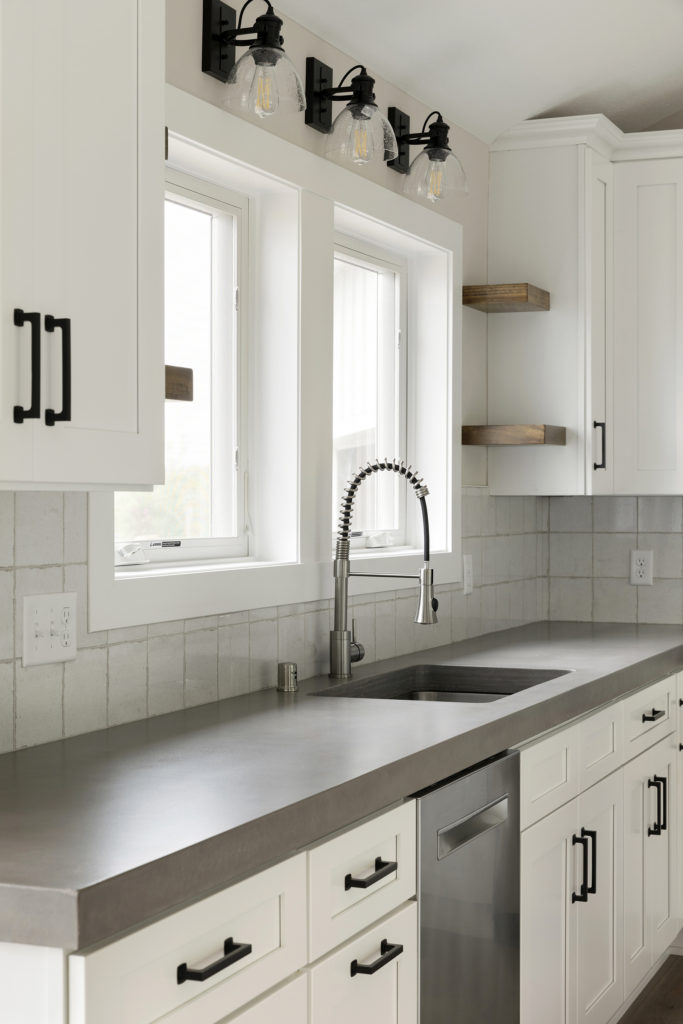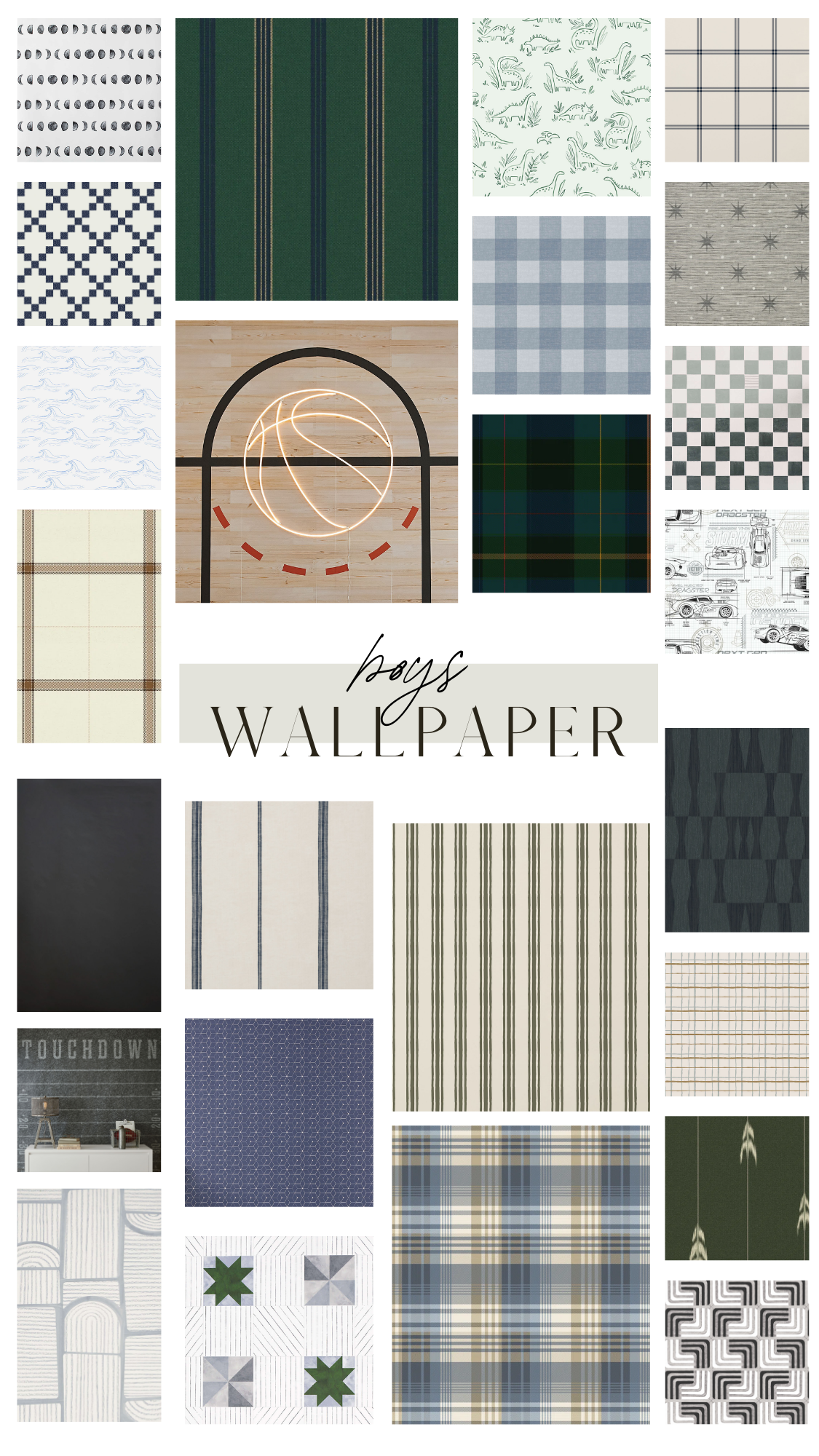The kitchen is arguably the most important room in your home, and there are a lot of things to consider when you’re designing it! From layout to cabinetry color and appliances to countertops, there are a ton of choices, and they can feel overwhelming. Today we’re talking through the various countertop options for your home, and the pros and cons of each!
Granite

Granite is definitely one of the most popular countertop options. It’s mined from quarries around the world and cut into slabs. These slabs are polished to show their natural design and then sealed before installing them.
Granite is a porous material which means it needs to be sealed annually to prevent bacteria growth and staining. That being said, the sealing process is pretty straightforward. You can purchase a sealant from many locations, and you simply wipe it on and let it dry for a day. It’s a great choice for a luxury, timeless kitchen, and can be pretty affordable, too!
Cost: $35-$100/SF
Quartz

For a slightly more luxury countertop, quartz is a great option. Quartz is a mined stone as well, but in much smaller sizes. Quartz comes in small particles that are then crushed and manufactured into a slab; a typical quartz slab is 96% quartz and 4% resin. The design in quartz slabs is created with pigment and resin. Some quartz designs are made to look like granite, marble, concrete, and others are just a solid color.
Quartz, unlike granite and marble, is maintenance free and does not have to be sealed yearly. It is also more durable than granite; quartz is a level 7 on the Mohs Hardness Scale, while granite is usually a 5 or a 6. And just for a fun reference, diamonds are a 10.
Quartz is also non-porous, and so long as you’re buying a reputable brand, it should be resistant to stains – and a lot of them are antimicrobial. That being said, we have heard of people buying cheap quartz and having issues with staining because subpar ingredients were used in the slab creation, so quality always matters!
Cost: $80-140/SF
Marble

Marble is an undeniably popular choice for kitchens and bathrooms alike, and we get it – it’s sleek, beautiful and timeless, and pretty affordable, too! Unfortunately, there are also a few downsides to using marble as a countertop. First, it’s a porous surface, which makes it high-maintenance. Pores mean stains, and once your counters are stained, they can be hard to reverse. Because of this, sealing your countertops regularly (every six months, ideally) is essential. Marble is also softer than other stones, like granite and quartz, so it’s more prone to chips and nicks. If you’re willing to put in a little extra work, marble is a great, beautiful and affordable option for your countertops!
Cost: $45-180/SF
Concrete

Poured concrete countertops have gotten more popular over the past few years, and we understand why! Concrete counters are a good combination of rustic-meets-modern-meets-industrial, and they’re a great neutral option for a variety of design styles. Beware, though, concrete countertops aren’t a very DIY-friendly option. They involve building custom frames to pour the concrete into, and it takes a bit of work to get a smooth, bubble-free pour! You’re best off hiring a professional for this one.
Cost: $65-135/SF
Butcher block/wood

Wood countertops are a great, budget friendly option that looks clean and fresh, and it’s DIY-friendly, too! Some people opt for using wood or butcher block countertops for just part of their kitchen, like an island, or for all of their counters. You can buy it custom by square foot, or find a variety of pre-cut slabs to fit any size counter, making it easy to source and install yourself! Keep in mind that in order to maintain wood, you need to help it’s natural moisture in by oiling it regularly, and if you don’t want it to wear quickly, continue using cutting boards as you would on any other countertop.
Cost: $40-$60/SF
Other Options
Of course, there are other, cheaper options for your counters, like laminate, tile and faux slabs of stone. Just keep in mind that generally speaking, you get what you pay for. Investing in quality countertops (and maintaining them!) is definitely worth it in the long run.
We want to know what material you prefer for your kitchen countertops, and how to chose it! Would you choose differently if you could? Let us know in the comments and over on Instagram @AlmaHomes, too. Happy New Year!




I was thinking of getting my kitchen remodeled starting next month since I wanted something more spacious and open, so I’m getting a new island countertop for it as well. It caught my attention when you said that quartz is maintenance-free since they’re more durable and non-porous compared to other materials, so they’re well-suited to use for kitchen countertops. I’ll be sure to consider this once I find a countertop distributor to contact soon.